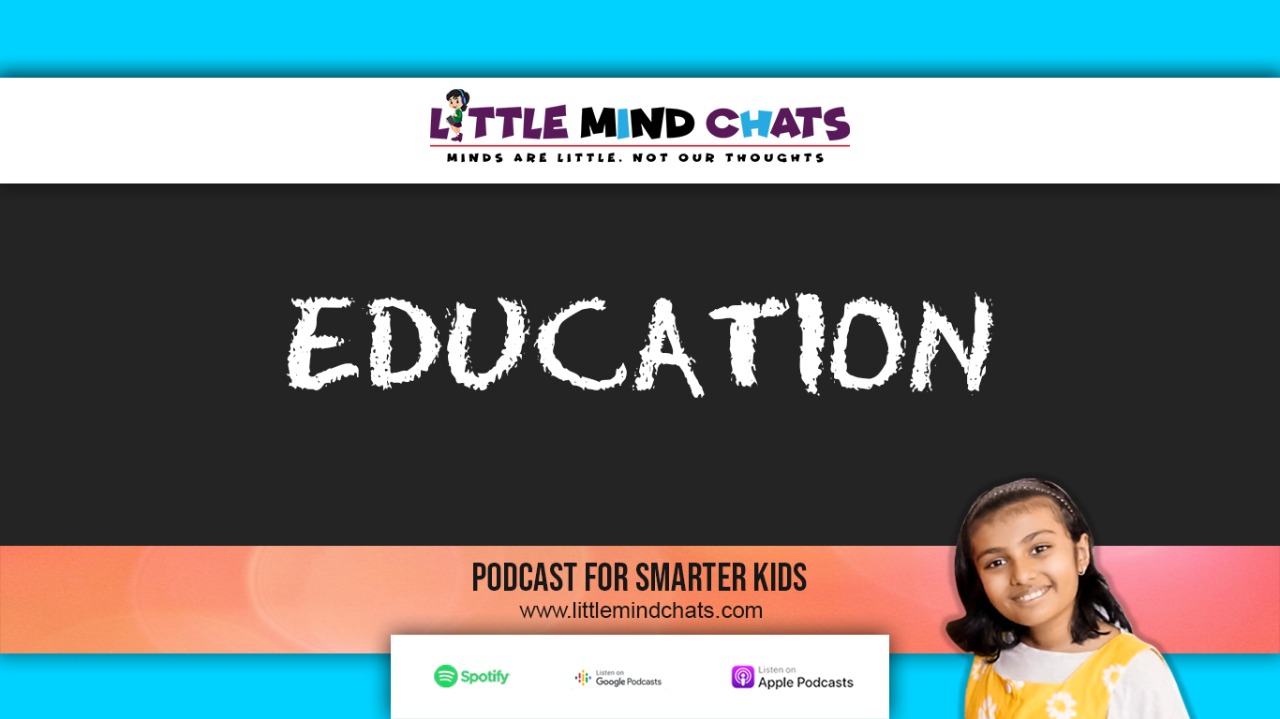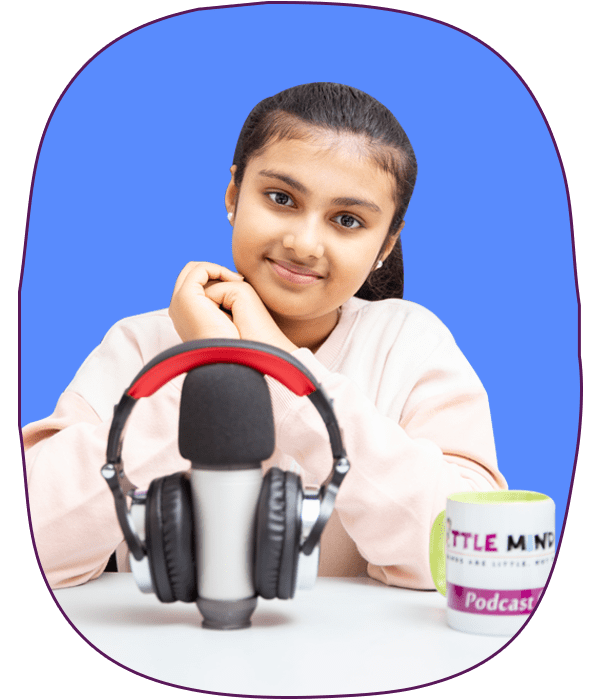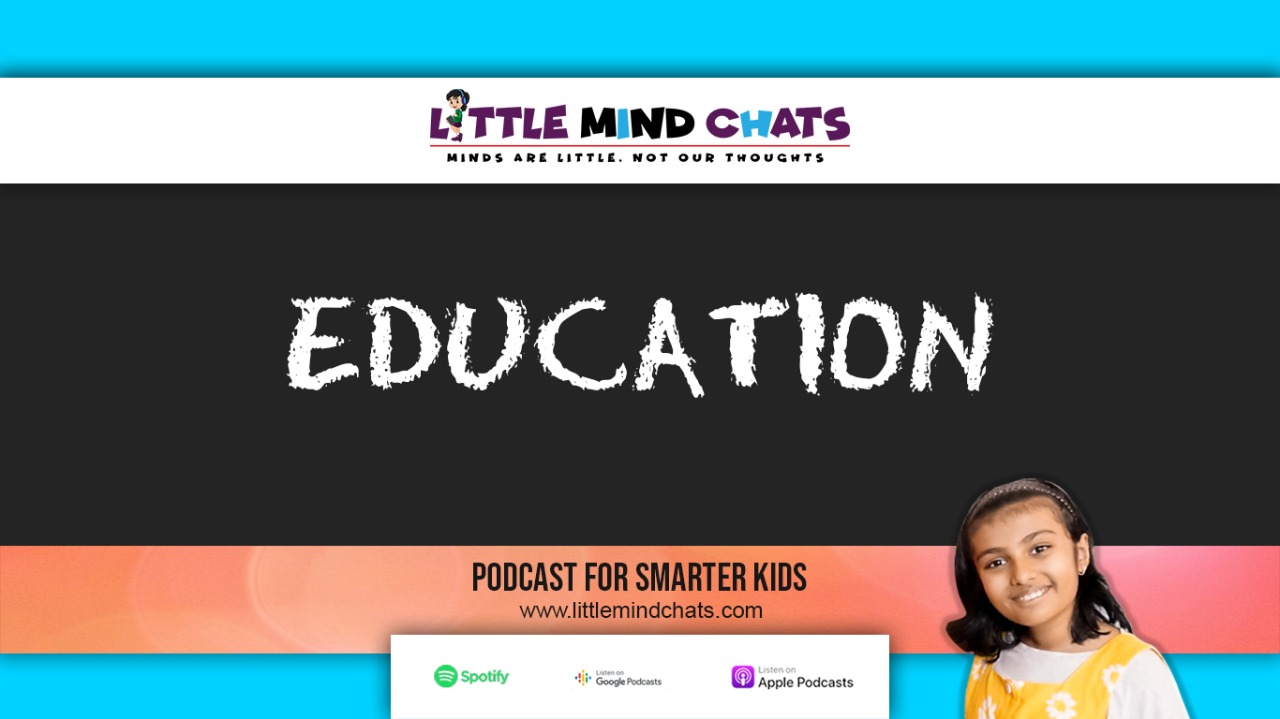046: Future of Education (NEP 2020) – Part 2
Transcripts
SEASON-3
EPISODE-46 FUTURE OF EDUCATION (NEP 2020) – PART2
[0.01] {Background Music}
[0.07] Siyona: Hi, welcome to my podcast Little Mind Chats. Minds are little, not our thoughts. I’m your host Siyona. In your previous episode, we spoke to Dr. Chetan Singai about the changes to become as part of our National Education Policy (NEP 2020). Why again this week you ask? Oh boy! One another topic at hand is called law sell. I think it deserves more time. I’m not sure if you’ve heard of Dr. Chetan Singai in my previous episode, he is currently working as Deputy director in Ramaiah public policy centre (RPPC) and as associate professor Ramaiah university of applied sciences, Bengaluru. He obtained his PHD from Indian Institute of Science, Bengaluru. I have always dreamt of being there some day. Dr. Chetan was even awarded social justice medal by the ministry of law and justice, Government of India for his service towards Human rights and women empowerment by our honourable chief justice in India in 2007. The reason why he is best suited to make us understand further on NEP, it’s because he was associated with the committee to draft the National Education Policy between 2017 to 2019 in the ministry of Human Resource Development, Government of India, New Delhi as the chief consultant.
[1.45] Siyona: Hello, Dr. Chetan, welcome back to my show. How are you doing today?
[1.51] Dr. Chetan: Hi Siyona. I’m good. Thank you.
[1.53] Siyona: Let’s continue our discussion with my first question. “What does it mean when NEP says we have flexibility in choosing our subjects?”
[2.03] Dr. Chetan: Well flexibility is in many ways but let me only share two of them. Explicit reason of flexibility here is that schools here must have freedom to choose their curriculum. It should not be given to them by somebody outside the school and what is that body? It’s called as the National Curriculum frame work. 2015 is the one which use the set of guidelines for how the curriculum should be. Schools have very limited role. Imagine a school which is in Bangalore and we have their National Curriculum Framework being drafted in New Delhi.
[2.38] Siyona: Yeah. Makes less sense.
[2.40] Dr. Chetan: Right? I was just there and we have school which has its own unique set of challenges and opportunities. But they are unable to respond to it. So, they have to have certain flexibility in designing their curriculum based on their needs. Based on their strengths. Right? Based on their weaknesses how do we overcome that? Whereas, second flexibility is in terms of how the assessment takes place. Again, there’s very limited scope because we have the board exams. Board exams are all India exams. Right? So, the questions are already decided by somebody at the central government level or at the state government level. So, assessment has to be also school centric. Respective schools should develop their assessment and at the same time schools must have their own curriculum. And if they have these two, they can enjoy utmost freedom in delivering the curriculum. What we call the pedagogy. So, because of these two limitations, their pedagogy is also not innovative or not very creative. Right? So, only few schools who come under the ICSE and other boards which are not imposed by the government or controlled by the government, they have that flexibility. So today all schools must have it. It is what NEP talks about.
[3.54] Siyona: Hhmm. Okay. I think every school deserves to decide what their students get to learn.
[4.02] Dr. Chetan: Yeah.
[4.04] Siyona: My next question is, “Will the normal syllabuses like CBSE, ICSE etc still remain?”
[4.12] Dr. Chetan: Yeah. More or less it will remain. But it will take sometime to face that out. Because as I mentioned earlier, the impact that school education has on our population and the process that is the complex structure of school system that we have, we cannot overnight change the system. It will gradually phase out. The intention of the educational policy is that, NCERT has a body or the text book making body will remain. But they’ll change their approach and process. Where it will make the text book bilingual. For example, make the text book mostly to do with learning by fun you know by having more and more cartoons for example. Depicting certain kind of imagination for the child like you know how much you enjoy reading cartoons and you know books which have pictures, images.
[5.02] Siyona: Yeah. I like reading the comic strips on the newspaper. But sadly, in this lock down time they stopped putting comic strips on the……….
[5.10] Dr. Chetan: What did you like in the comic strips? The text or the image?
[5.13] Siyona: The image.
[5.15] Dr. Chetan: Yeah.
[5.16] Siyona: And because of the image, I was able to get the joke from the text.
[5.20] Dr. Chetan: Yes. Exactly. So, text books have to become like that. And that is the intention of the NEP 2020 that if you want to make learning joyful, where you have to change the text books. You can not have the same text books and expect the new outcome. Right? So that is another thing. So bilingual text books are one thing which are going to come in the syllabus and the text as well as making text books more and more creative and joyful is the other thing which are expected as an outcome of new education policy. And I think with that assessment will definitely change. Right? You can not have the images in the question paper. So, you need to create a new system of assessing. Right? So that becomes as I mentioned cumulative and not summative. And children would like to go and write exam otherwise they will get scared and just before the exam they will develop fever or cold.
[6.10] Siyona: (Chuckles)
[6.10] Dr. Chetan: It happens. Isn’t it? Earlier,
[6.14] Siyona: I was like full on yay, yay, yay for my first ever exam in India. But then, since my second unit test is approaching, I’m like oh, oh.
[6.25] Dr. Chetan: Yeah.
[6.26] Siyona: And not yay, yay.
[6.27] Dr. Chetan: Correct, that is the worry that each child has when they go to school or when they want to examination. Right? Moreover, after that there is a competition. Who will score more, who will score less? So, before you entered school when we were in school, we had marks. That is 100 marks. Ranks. First rank, second rank, percentage. You know, if I miss out by 5%, 2%, 1%, 3%, it’s a huge competition.
[6.53] Siyona: Oooo.
[6.55] Dr. Chetan: Fortunately, over last few years, we have moved to grades. A grade, B grade, C grade. You know remember those grades which you have now?
[7.03] Siyona: Yeah.
[7.04] Dr. Chetan: That has actually helped to some extent. You know. Because the range of competition has to some extent reduced.
[7.08] Siyona: Hhmm.
[7.09] Dr. Chetan: Earlier it was just 0.2%, 0.3% and some parents used to compare, “oh my God! My neighbour child has got 92% and you have got 91.4%?”
[7.20] Siyona: Ha ha (chuckles). That’s funny.
[7.22] Dr. Chetan: Right? 91.6% and now it is grades where we have a person scoring or child scoring may be, I am not sure 90 to 100% as A grade so there is huge range of 10% now. So, there is no such competition. But I think that was change over days, over years, with NEP I think there will be new changes coming in. where it will further reduce. Right? So, this whole unwarranted competition be reduced. And the pressure on the child will be also reduced and moreover, parents also will be reduced. So, I urge the parents also in this context that we need to compete but don’t compete in such parochial narrow ways. Compete in a much more different way. That is in terms of how your child is creative. Right? That is very important. Yeah.
[8.10] Siyona: Yeah. Well, some parent like kind of ban the child’s creativity when it comes to exam times like art work or playing with friends or exploring the garden and stuff like that.
[8.24] Dr. Chetan: That’s true. That’s where is said you know why they ban it. Because it is not being assessed. It doesn’t get reflect in your mark sheet or transcript. That is what NEP says, “please don’t create these silos of the curricular and extra-curricular. Everything is curricular. If a child is able to perform good in sports and they are good at it, then we often feed that experience as outside school. But it should be very much part of the curricular activity and that is where teacher training, school’s system changing, assessment techniques changing and more importantly parents attitude changing becomes very, very critical. So, we have to bring all of them together. You seem to be excited or thoughtful about it.
[9.12] Siyona: Yeah. Well I just love to see this change especially in parents.
[9.15] Dr. Chetan: I think you’ve already started to sow the seed. I hope it reaches to the people. This conversation.
[9.22] Siyona: Yeah.
[9.23] Dr. Chetan: I’m sure they will also change. Yeah.
[9.25] Siyona: Yeah. Well, that completes my set of questions. But do you know what Dr. Chetan, because it’s such important topic, I’ve decided to take in a couple of questions from parents too. Hope you’re okay to answer them for us?
[9.39] Dr. Chetan: Yes. Definitely.
[9.41] Siyona: Okay. Mrs. Arpita Nath asked, “What will be the age criteria for class 1 in CBSE as per new Education policy?”
[9.52] Dr. Chetan: Well these criteria as of now is anybody between 5 and ½ to 6 years is what the criteria is for class 1, and it’ll continue to be there. And what changes is the process admission and entry. Right? Again, there were lot of tests which were conducted to get the child in and all those things. Now the schools have to evolve techniques by themselves to see how they would get the child into the school and while not imposing any sort of competition in order to get the child into the school. So, that is where it’s going to change but the entry age is almost going to be same. There’s not much difference or change that is going to happen. Right?
[10.34] Siyona: Hhmm.
[10.35] Dr. Chetan: so, till between the range of 5-6years is what we can claim. But yes, what I can see is to add to Mrs. Arpita’s question is that the type of children who are getting into first grade in due course in the next 8 to 10years with this new approach of the NEP would be very different from what we see today in the first grade because of their education in the age of 3-6 that is the pre-first grade that is the pre-school during the early days of the school is going to be much more impactful than what we see today. So, I think age, there’s a change. It would be 6 or may be 5 and ½ to 5year 8months. That depends on the child’s birth date and the month the child is born between that range. But other than that, there is not going to be major shift in terms of the entry age.
[11.30] Siyona: Yeah. Entering a school especially in India, you need to write an entrance exam and there might be a child with some sort of condition like learning disability or down syndrome and they might not know many of the answers to the question paper…
[11.48] Dr. Chetan: That’s true.
[11.49] Siyona: And the parents, especially the parents their impression would be that this school would help my child to become smarter even in their condition,
[11.59] Dr. Chetan: That’s true.
[12.00] Siyona: They can get smartest as possible and also, they’ll join them into school but when they find that their child could not write the exam,
[12.11] Dr. Chetan: Mmm…huh.
[12.12] Siyona: That they could not know much of the answers, the school would reject the child and so the child would like come out with no school to go to.
[12.25] Dr. Chetan: Yes. That’s unfortunate thing I agree with you because these tests are beyond the capacity of the child and you know it tests the child at… Suppose you test the child at the age of 5 or 6 but test the child at the age of… Assuming the child is 8 or 9, it’s very , that’s a competition that I was talking about and that has to change. And that is what we change in course of time. Because, any policy to have an impact will take some time. Because, right now the government of Karnataka has adopted the policy. The government of Karnataka approved the policy and they’re now gradually going to bring change. So, I think in the next 10years from now, 2030 I would say major changes happening. But I think right now our task, rather our duty of parents and us in education is to start thinking about it from today. And not changing our attitude and mindset. That should be the first starting point rather than waiting for the government to say from tomorrow these tests are going to change. I think that will come but now we’ve to prepare ourselves to say, avoid these kinds of tests. You know rather talk to the child and understand what he or she wants. How he or she thinks differently. I’m sure your brother is doing lot of crazy things which you didn’t expect. Right? Very, very innovative things. He has a different way of breaking milk baby or eating food baby or you might not find with the other child. Their innovative is something else. But it is our responsibility to identify that uniqueness. That is what I call competences. Now, that is where I think the schools need to change and evolve for the betterment of the child and their education. But unfortunately, that is not happening because it’s a huge competition. For every 100 children, right? We’re seeing schools with less than 10 or 8 available and that’s where I can now see the problems and challenges of the schools also. Because they can’t take everybody. The quality will collapse. But what we could do is, prepare the system in such a way that both the schools and the parents and the child have a contusive environment. I think the policy will take time. In the next 10years we are seeing these major changes coming through. Until 2019 we were direction less. They call like we were running like headless chicken everywhere.
[14.45] Siyona: (Chuckles)
[14.46] Dr. Chetan: we don’t know what to do. At least we have a direction now, a road map for the next 10years.
[14.50] Siyona: Mrs. Suparna Banerjee asks that, “given the vast syllabus of ICSE Board, is the NEP going to effectively reduce the pressure on kids?” Her daughter is in first standard.
[15.03] Dr. Chetan: Yes, the pressure is not in the syllabus. The pressure is in the examination assessment. And also teaching techniques are very important. See syllabus is almost constant as I said earlier. How do you deliver the syllabus? That is the pedagogy. That how do you… As I keep telling you, how do you make that classroom environment joyful. Makes lot of difference in whatever the content of the syllabus is. So, that’s what one suggestion is that make the syllabus more creative, more imaginative and more hands on. Right? The same physics, chemistry, biology, maths can be taught while learning and while doing some kind of activity. Right? So, the syllabus is not a problem here. The problem is in terms of how to deliver it and how to then assess the child for what they have learnt in the syllabus. In fact, some of the boards have a very nice way of doing projects and all those things. But unfortunately, what happens is there’s not much support from the school to do projects. They end of coming home and doing it and there’s lot of…because as you said, the syllabus is so much that they want to complete it in the school and the remaining activity happens at home. I would rather argue that everything should happen in the school. And home should be just family. Home should be just enjoying what happens at home. The extended family, the conversations as you said, brother picking up these random codes and then reconstructing it. Right? So that’s a fun thing, part you know. All the extra activities that are not happening in the school are happening at home. That’s where the syllabus issue comes in. so I think that is what we need to change and I think that is again in the need of the hour and there are situations that we are seeing schools responding to it or not all schools.
[16.47] Siyona: Sometimes they give so much homework that the child barely communicates with the family and they’re always with their pen or pencil and a notebook and a text book.
[16.57] Dr. Chetan: Yeah. That’s true.
[16.58] Siyona: And never with their family. So, they don’t develop connection to anything.
[17.02] Dr. Chetan: Yeah.
[17.03] Siyona: And… so, it’s kind of sad.
[17.07] Dr. Chetan: That’s true. And they miss out on all the fun happening at home.
[17.12] Siyona: Yeah.
[17.13] Dr. Chetan: Yeah. And by the time they grow up, it’s too late to come back to the…
[17.15] Siyona: Yeah.
[17.16] Dr. Chetan: Yeah. That’s true.
[17.20] Siyona: Yeah, well. Since I came to India, I kind of lost my touch with creativity because of the homework, the notes, the online classes and blah, blah, blah whatever
[17.32] Dr. Chetan: Yeah. That’s true. There’re lot of… you’ve become very busy with online classes, I think.
[17.36] Siyona: Yeah.
[17.37] Dr. Chetan: Constant surveillance on the online classes but again you find creativity somehow. And I think that is the fun of creativity, but only thing is schools they should create more opportunity for being creative. That’s the only request I have for all the school teachers and the administrators that provide more and more space for the child to be more and more creative as simple as “please leave her walls white” and give them colour pens. Let them draw on the walls. Right? But don’t scold them for doing that. The more colourful the school is, the shabbier the school looks, I think that is the more creative school. Right? So, that’s how the creativity comes. Isn’t it?
[18.21] Siyona: Yeah.
[18.22] Dr. Chetan: So, have you seen the higher education, universities having creativity wall? There are some universities in the world that are having creativity wall. You know that simply has a blank board, people come and draw their ideas.
[18.38] Siyona: Hhmm.
[18.39] Dr. Chetan: Yeah. That’s a one thing which they could do. They don’t need a policy for it. They just need a space and some intent to do it. Right? So that is how you just develop creativity.
[18.50] Siyona: The last question is, Mrs. Sara Ahmed’s question is, “now that there will be more stages like 5+3+3+4, are they going to bring in any rules that will enable home-schooling children to enter into mainstream schools and vice versa?”
[17.10] Dr. Chetan: Yeah. See the structure has definitely changed from 10+2 to 5+3+3+4. However, the open schooling or this alternative schooling will definitely continue to be there. Right? Because they have added value in many ways and they would continue to be there. But what changes is, the flexibility of entry. Right? What is happening today is, children of alternative schools are unable to come into main streams. Alright. Because of the syllabus is different, assessment is different, expectations are different. But what is going to change now with this structure, since the overarching policy recommendation is to make learning joyful, creative, competency based, then shifting from summative to cumulative kind of assessment, they are nothing but they are also like alternative schools who are now accommodating slow learners, what they call you know and to learners with difficulties. So, I think what we are seeing is in next 10 to 15years, the nomenclature or the alternative main stream is going to phase out. Right? They will be merged together gradually and that is where the new structure talks about. Because the old structure was very stringent or a very difficult structure or a complex structure where it did not allow for children coming from alternative schools to be part of this. So, this structure the new one is proposed in such a way that there is flexibility in entry and exit for children who come from other schools or other sections or there are children who come from other language to the English language, so that has to be provided. That is where the new structure helps in overcoming that barrier.
[20.51] Siyona: Well, that must be a major change.
[20.55] Dr. Chetan: Yes. In deed.
[20.56] Siyona: That was the longest conversation I’ve had so far…thanks for patiently answering all of my questions and even some parents’ questions.
[21.06] Dr. Chetan: Thank you and I’m not surprised. Conversation is long because we are having a policy after so many years. So, there are so many issues and the policy for upcoming years up to 2040. I’m sure there are many issues and I’m not surprised. And I hope you’ve got what you wanted in terms of understanding the system of school education and its impact on the nation. Not just on the children. On the nation. I think that is very important. That’s the foundation how we build our nation. And how we build our entire higher education, research, innovation, echo system. It starts from the school at the age of 3. Having said that, I’m not saying we should put lot of burden on the child, but still we’ve to make education or learning joyful. Right?
[21.56] Siyona: Actually, out of this conversation I’ve understood that NEP changes would bring in a huge relief for kids and parents without compromising on our quality of education. That’s the need of the hour.
[22.08] Dr. Chetan: Yeah.
[22.09] Siyona: I thankyou so very much for taking time out of your busy schedule and coming to my studio Dr. Chetan.
[22.14] Dr. Chetan: Thank you so much. I look forward to having this conversation leading to lot of change in people’s mindset and also the children’s mindset. Not just people’s in the sense, not just teachers or parents, they are very important but also children. Because if they hear from you, who is actually experiencing it. I know I’m bringing change. I’m sure you’ll be good brand ambassador for the change that we are looking at. Thank you so much and I had a great conversation with you and also learnt a lot with your experience back home, with your schooling system back in UK and your experience that you’re having in India. Thank you so much.
[22.54] Siyona: You’re welcome! And thank you.
[22.56] Dr. Chetan: Thank you.
[22.57] Siyona: So, friends, I hope you feel a lot more relieved that the change in our education that’s coming up in the next few years is a lot more fun and happening! I’m so looking forward to it now…Please do spread the word on this super informative episode and follow me on Instagram, Facebook and LinkedIn for more…
[23.18] Siyona: This week’s question is, the classrooms are likely to look more colourful and interesting after NEP 2020 is implemented. TRUE OR FALSE. If you could answer this simple question, you get a chance to be in our monthly lucky draw. Please do send in your answers to siyona@littlemindchats.com. Thanks a ton for listening! Bye.
Other Interesting Episodes
01 Nov-20. by Siyona
034: Importance of Education
29 Oct-20. by Siyona
033: Concluding Season 2/ Welcoming Season
No Comment Found..










